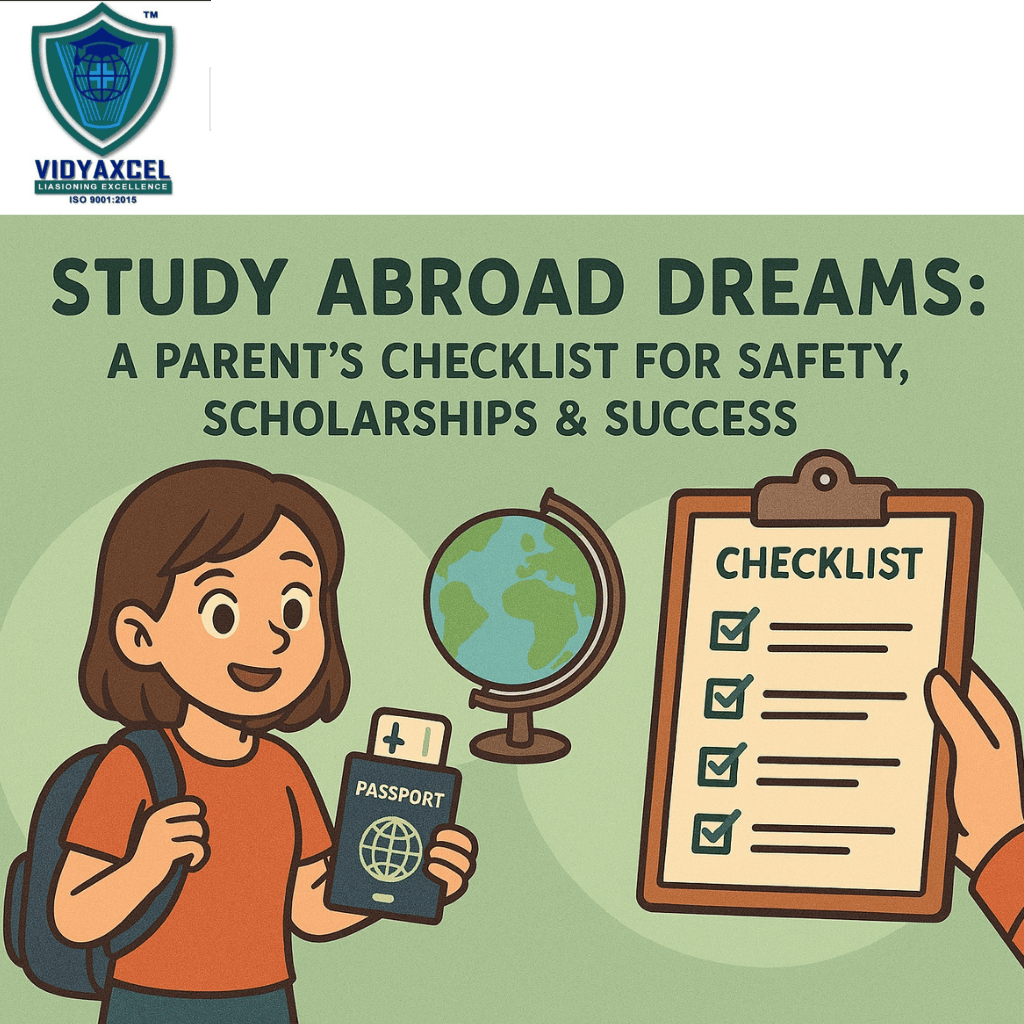Blog Details

05Apr
Study Abroad Dreams: A Parent’s Checklist for Safety, Scholarships & Success
For many families, the dream of studying abroad marks a proud and emotional milestone. It’s not just about academic success—it’s about independence, opportunity, and global exposure. But for parents, it can also bring a wave of concerns: Is my child safe? Can we afford it? Are they truly ready? Navigating the study abroad journey requires more than just good grades and a passport. It demands thoughtful planning, financial readiness, and emotional preparation—from both students and their parents. This checklist is designed to guide parents step-by-step, ensuring that your child’s international education journey is not just a dream come true, but a safe, supported, and smartly-funded experience.
✈️ Study Abroad Dreams: A Parent’s Checklist for Safety, Scholarships & Success
Sending your child abroad for higher studies is a life-changing milestone—not just for them, but for you too. While it opens doors to global exposure and world-class education, it can also bring a fair share of stress, uncertainty, and logistical hurdles—especially for parents.
Whether your child is aiming for the US, Canada, UK, Australia, or Europe, here's a practical and emotionally aware checklist for parents who want to ensure safety, scholarship success, and a smooth journey abroad.
✅ 1. Safety First: Know the Basics
- Research the destination: Look into the political stability, crime rates, health care system, and student safety record.
- Check the university’s safety policies: Do they offer campus security, emergency helplines, mental health support?
- Accommodation: Help your child secure verified housing—avoid shady third-party rentals.
- Emergency plans: Make sure your child knows local emergency numbers, embassy contacts, and has travel insurance.
🔒 Tip: Apps like Google Maps, Life360, and WhatsApp location sharing can help stay connected safely.
💸 2. Scholarships & Financial Planning
- Start early: Many scholarships open a year before intake. Keep track of deadlines.
- Look for government & university scholarships:
- Fulbright (USA), Chevening (UK), Erasmus+ (EU), DAAD (Germany), etc.
- Private & NGO scholarships: Check platforms like Studyportals, Fastweb, or scholarship sections on university websites.
- Budgeting: Create a complete cost plan—tuition, living, travel, visa, and emergencies.
💰 Tip: Encourage your child to learn basic budgeting and track expenses using apps like YNAB or Mint.
📝 3. Application & Visa Process
- Help, don’t take over: Support your child with documents but let them handle emails, SOPs, and interviews. This builds independence.
- Documents checklist:
- Passport
- Academic transcripts
- Letters of recommendation
- Statement of Purpose
- Financial documents for visa
- Visa process: Book appointments early and double-check entry requirements—every country differs.
🛂 Tip: Attend university webinars and visa Q&A sessions—they’re full of insights for both students and parents.
🧠 4. Emotional & Mental Readiness
- Talk openly about expectations: Discuss academic goals, safety boundaries, and communication routines.
- Normalize culture shock: Support them through the adjustment phase and homesickness.
- Encourage independence: Let them make mistakes and learn. Be a guide, not a controller.
🧘 Tip: Suggest mindfulness or journaling to help your child process this new chapter.
🌐 5. Staying Connected Without Hovering
- Set up weekly check-ins via video call, but avoid micromanaging.
- Follow their university's social pages or parent newsletters for updates.
- Trust the values you’ve raised them with—and know they’ll reach out when needed.
📲 Tip: Create a family group chat for casual updates and emotional support.
Conclusion
Watching your child take off toward their study abroad goals is a proud moment—but it’s also a leap of trust. With the right preparation, clear communication, and a focus on both logistics and emotional wellbeing, you can help them thrive in this exciting new chapter. Remember, your role isn’t to control the journey, but to be their strongest support system. With this checklist in hand, you’re not just sending them abroad—you’re helping them step confidently into their future.
FAQ’s
What is the right age for a child to study abroad?
Most students go abroad after Class 12 for undergraduate studies or after graduation for master’s programs. However, foundation programs and exchange programs are also available for younger students (17+). The key is emotional and academic readiness, not just age.
Is it safe for girls to study abroad alone?
Yes, with proper planning. Many countries are very safe and offer support systems for international female students. Choose well-ranked, urban universities, avoid late-night commutes, and ensure student housing is secure.
Should I hire an education consultant or can we manage this ourselves?
If you're confident and have time to research, you can apply without a consultant using trusted platforms and official university websites. However, if you're short on time or need personalized help, a reliable consultant can simplify the process.
How often should we stay in touch after they move abroad?
Schedule weekly or bi-weekly video calls to catch up, but also give them space to grow independently. Stay connected emotionally, not controlling.
Can students work part-time while studying abroad?
Yes, in most countries like Canada, UK, Australia, and Germany, students can work 10–20 hours per week during semesters and full-time during breaks. This helps with expenses and gaining experience.
Our Office: West Bengal, Maharashtra & Delhi.
For More Infomation about admission in Medical, Engineering, Management & Study in Overseas Details.
View Current Study Overseas, Medical, Engineering & Management Admission Details Video.





